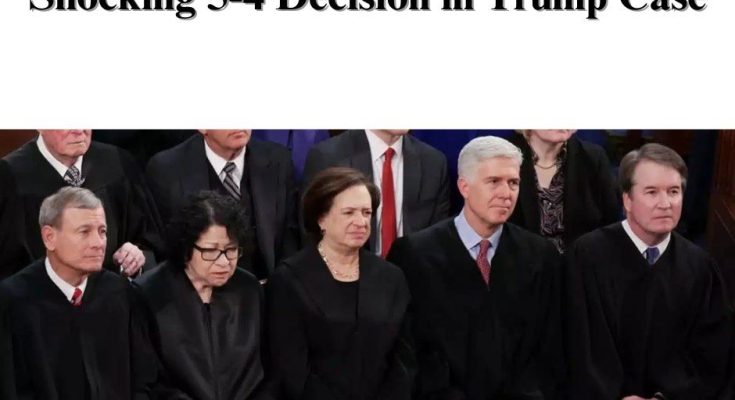The ruling was decided by a narrow margin of 5-4. Although the order was unsigned, dissenting opinions were expressed by four conservative justices: Samuel Alito, Clarence Thomas, Neil Gorsuch, and Brett Kavanaugh. The majority comprised Chief Justice John Roberts, along with Justices Amy Coney Barrett, Elena Kagan, Sonia Sotomayor, and Ketanji Brown Jackson.
The majority opinion highlighted that a court-imposed deadline for the disbursement of the funds had already lapsed, prompting the lower courts to clarify the government’s obligations to comply with the temporary restraining order.
In a strongly worded dissent, Justice Alito expressed his astonishment at the court’s decision, suggesting that it allowed the lower-court judge to mandate the administration to unfreeze the contested foreign aid. Alito remarked, ‘A federal court has many tools to address a party’s supposed nonfeasance. Self-aggrandizement of its jurisdiction is not one of them.’ Despite the 5-4 ruling, legal analyst Steve Vladeck from CNN and a professor at Georgetown University Law Center characterized the decision as ‘extremely modest.’
He noted that the unsigned order does not compel the Trump administration to immediately disburse up to $2 billion in foreign aid; rather, it simply paves the way for the district court to enforce those payments, contingent upon more precise specifications regarding the contracts that must be honored. The vigorous dissent from four justices indicates that the Court may remain divided on significant Trump-related cases that are forthcoming.
The appeal was expedited to the Supreme Court within a matter of days, which is remarkably swift by the standards of the federal judiciary. This marks the second instance in which the justices are confronted with cases related to Trump’s attempts to centralize authority within the executive branch and significantly alter the government following his inauguration in January.
The core issue of the case revolves around billions in foreign aid from the State Department and the US Agency for International Development that Trump suspended in January as part of his efforts to curtail spending and align these agencies with his policy objectives.
Several nonprofit organizations that depend on this funding for global health initiatives and other programs have filed a lawsuit, claiming that the administration’s actions infringe upon Congress’s authority to regulate government expenditure and breach a federal statute governing agency decision-making.
In a statement released on Friday, the organizations characterized the administration’s conduct as having a ‘devastating’ effect. They informed the court that the funding ‘promotes US interests internationally and enhances – and in numerous instances, literally saves – the lives of millions worldwide.’ They further asserted, ‘By doing so, it helps mitigate issues such as disease and instability abroad before they impact our nation.’
On February 13, US District Judge Amir Ali mandated that a significant portion of the funds continue to be disbursed on a temporary basis while he deliberated on the case. Shortly thereafter, the plaintiffs contended that the administration was in violation of that order and persisting in obstructing the disbursement of funds, prompting Ali to instruct the Trump administration to allocate the contested funds by midnight on Wednesday.
Judge Ali was appointed to the bench by President Joe Biden. In response, the Trump administration swiftly filed an emergency appeal to the Supreme Court just hours before the deadline, requesting the court to at least delay the order for a few days. The administration argued that it was making ‘substantial efforts’ to evaluate payment requests and disburse the funds, but it was unable to activate the funding quickly enough to comply with Ali’s timeline. The organizations that initiated the lawsuit have expressed skepticism regarding that explanation.
The organizations stated in a Supreme Court filing earlier on Friday that the government has not undertaken any significant measures to achieve compliance.
On Wednesday, Roberts, acting independently, granted a temporary reprieve to the administration by issuing an ‘administrative stay,’ which paused the case to allow both parties to present their written arguments. The chief justice is responsible for handling emergency matters arising from the federal appeals court in Washington, DC.
Among the organizations contesting the freeze are the AIDS Vaccine Advocacy Coalition, based in New York and focused on accelerating HIV prevention efforts, and the Global Health Council, located in Washington, DC, which represents various groups involved in health program administration.
The Trump administration disclosed in court documents that it is seeking to terminate over 90% of the USAID foreign aid awards. According to the administration’s filing, nearly 5,800 USAID awards were terminated, while more than 500 were retained, with the total value of the retained awards amounting to approximately $57 billion.
Additionally, the government informed a lower court that around 4,100 State awards were terminated, and about 2,700 State awards were retained, referring to the State Department. The extensive funding freeze and review of billions of dollars in assistance have brought aid programs worldwide to a standstill.
This situation coincides with the Trump administration’s decision to place a significant portion of USAID’s workforce on leave or to terminate their employment. Democrats on Capitol Hill expressed their approval of the ruling, asserting that it demonstrates the limitations of Trump’s authority to freeze spending.
‘That money had already been appropriated, and actions were already underway, so I believe the Supreme Court made the correct decision. The administration must now unfreeze those funds and enable contractors to proceed with their work,’ stated Rep. Gregory Meeks of New York, the leading Democrat on the House Foreign Affairs Committee.
Representative Pramila Jayapal described it as “a highly significant ruling” from “a court influenced by Trump.”
She stated, “I believe it underscores that Congress possesses the authority to allocate funds, and that individuals depend on that authority for these programs. When the work is completed, payment should be made as authorized,” the Democrat from Washington conveyed to CNN.
When questioned about her confidence in the resumption of payments, Jayapal expressed uncertainty, stating, “I am not confident about anything, but I hope the Trump administration will heed the Supreme Court’s decision.”


